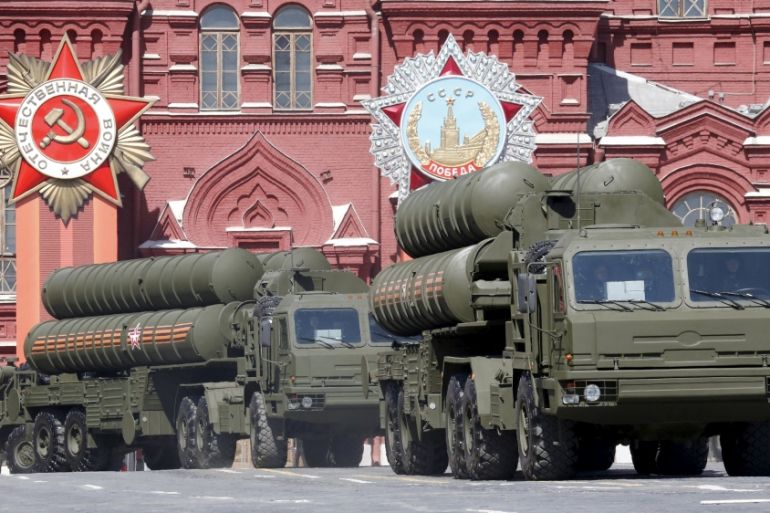S-400: Turkey’s mission to boost its air and missile defence
The NATO member is turning to Russia to strengthen its defensive strategic military capabilities.

Turkey and Russia have agreed on the technical details of a contract that would supply Ankara with the S-400 Triumf long-range anti-aircraft missile system, Victor Kladov, the director for international cooperation and regional policy for Russian state conglomerate Rostec, said last week.
Turkey’s ministry of defence has neither declined nor confirmed Kladov’s statement. Numan Kurtulmus, Turkey’s deputy prime minister said on Monday that two sides had not signed the contract yet, but the prior conditions were about to be finalised.
Keep reading
list of 4 itemsNATO allies must do more as Ukraine runs out of ammunition: Stoltenberg
Nordic tensions on the rise amid Russian anger over NATO accessions
Flag of NATO’s 32nd member, Sweden, raised at alliance’s headquarters
No other NATO country has bought the advanced air defence systems before.
|
|
The news about the deal raised questions as to why Turkey, which is a NATO member and hosts a base for the military alliance, decided to acquire Russian missiles that are believed to be incompatible with the systems used by NATO.
Patriot systems
Turkey stepped up its search for air defence systems after the eruption of the Syrian civil war in 2011, and its decision to back the armed opposition fighting President Bashar al-Assad.
In 2013, amid rising tensions in countries such as Syria, Iraq and Iran, the United States, Germany and the Netherlands – all NATO members – decided to station two Patriot surface-to-air missile systems in the southern Turkish cities of Gaziantep, Kahramanmaras and Adana.
The aim was to protect Turkey’s border and territorial integrity, as well as prevent any potential threats NATO could receive from Turkey’s southern border.
Yet, in August 2015, Germany said it would end its contribution to the anti-missile mission in Turkey, saying the risk of such an attack from Syria was over.
The US also said it would not renew the Patriot mission, which was due to end in October 2015. Before that, in August, the Netherlands said it was planning to pull its Patriot from Turkey, too. Their systems were later replaced by Spain’s.
OPINION: Why Turkey might buy Russia’s S-400 defence system
According to experts, the decision by NATO allies to pull their missiles legitimises Turkey’s necessity to try to establish its own system in order to reduce its foreign dependency.
In a report for Turkish think-tank SETA, Merve Seren, a security and policy expert, defended Turkey’s efforts to strengthen its defence industry and modernise its armed forces.
Seren said “the ‘security deficit’ that resulted from the need for NATO, to a large extent due to ‘compulsory trust’ and a kind of ‘strategic preference’, has gradually evolved into a ‘security vulnerability’ in conjunction with the change in the definition and perception of threats of high-priority risk”.
Technology-sharing
After separate attempts by Turkey to find alternatives, including with the US, France and China, failed for various reasons, Ankara turned to Russia’s S-400 system.
Turkey’s ultimate goal has always been to develop its own defence technology system.
|
|
Knowing that the Russian system was not compatible with the one used by NATO, Turkish officials stressed the importance of a technology-sharing principle with Russia.
On June 7, Kladov said Russia and Turkey had reached an agreement on the technical specifications of a contract that would supply Turkey with the air and missile defence system.
“There are commercial issues, there are monetary and financial issues, there are political issues,” Kladov said.
Following Kladov’s statement, a Turkish media report claimed that Turkey and Russia have signed a Memorandum of Interest.
According to the report, the two countries agreed on a two-battery system with 240 warheads, and search-detection-tracking and baffle radars for $2.5bn.
That sum will be split by Ankara and Moscow, and Turkey will receive the system within two and a half years.
According to SETA’s Seren, the S-400s, which use a very new technology, have not yet been tested.
She also said that Turkey has mostly received short-range threats, meaning that the stationing of the S-400s could end up being useless.